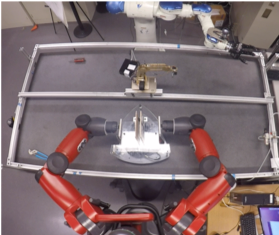This project will develop technology and perform ground-based testing to support operations for potential satellite servicing missions and assist in utilizing these technologies for future space exploration activities. The focus of this work applies robotic technologies to enable robotic tasks to be performed at regions of space that are unreachable by human space exploration to date. This task will require the development of advanced robotic space technologies and engineering research needed to provide infrastructure to support the Goddard Space Flight Center Satellite Servicing Projects Division (SSPD) plans to service orbiting space assets.
This task will require the development of advanced robotic space technologies and engineering research needed to provide support to the SSPD plans to service orbiting space assets. Specifically, technologies at a low technology readiness level (TRL) are of interest. As applicable, the contractor shall have sufficient processes in place for handling export-controlled data, including that provided by the Government and that resulting from the contractor’s research. Similarly, the contractor shall have sufficient processes for appropriately handling other government sensitive data and proprietary data provided by industry.
Technology Development for Robotic Servicing of Orbital Space Assets (4)
Technology Development for Robotic Servicing of Orbital Space Assets (3)
Technology Development for Robotic Servicing of Orbital Space Assets (2)
Technology Development for Robotic Servicing of Orbital Space Assets (1)
NASA Goddard Flight Research Center
John Wen
SSCO Technology Development for Robotic Servicing of Orbital Space Assets
Analysis, Synthesis, and Control of General Parallel Robotic Systems
Center of Intelligent Robotic Systems for Space Exploration
Project Tasks include:
1: Implementing Outer Control Loop with Transport Delay [FeedForward Control Compensation]
In conjunction with the SSPD, the Subcontractor shall assist the SSPD for the feedforward control compensation for robotic controls as they may apply to robotic satellite servicing, including capturing, transport, and berthing. The Subcontractor will work with SSPD to implement the subcontractor’s feedforward control compensation algorithms on the GSFC robotic testbed. Provide a test report after each performed test to include test data, results and analysis of the feedforward compensation algorithm. Recommendations shall also be made in the report.
2: Compliance Control Engineering Support for Robotic Servicing Tasks
The Subcontractor shall provide expertise, general consultation, and support for compliance control development on robotic systems. The Subcontractor shall provide tuning of robot joint level control for the SSPD compliance controller. The Subcontractor shall tune/program the compliance controller based on SSPD-provided test cases. The Subcontractor shall implement a higher order controller with notch filter in conjunction with active compliance control to compensate for natural frequencies within the control bandwidth. The Subcontractor shall examine input command preshaping to move space objects from the grappled state to the berthing system. The Subcontractor shall support SSPD in running the test cases on the SSPD robotic systems.
3: Manipulation of Space Objects
The Subcontractor shall develop a testbed for exploring the concept of operations for robotic manipulation of relatively massive space objects, including potential satellite servicing client vehicles. SSPD will provide test use cases and the Subcontractor will demonstrate and test the manipulation and securing of objects using the contractor’s Motoman and Baxter robotic system.
4: Spacecraft Navigation
The RPI research team has extensive experience in the area of spacecraft navigation, with particular depth in the areas vision-based sensing, LIDAR-based sensing, and navigation filter design. These technical areas are of critical importance to rendezvous and proximity operations (RPO) for a number of future GSFC missions, such as Restore-L. Therefore, we aim to apply this expertise to problems of interest to GSFC in three primary ways: (1) the review of GSFC-produced documentation, (2) attendance at relevant peer reviews (as invited), and (3) the production of RPI-written documents (and any supporting analyses).





